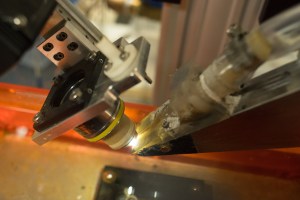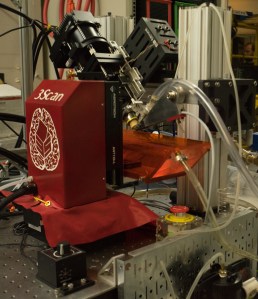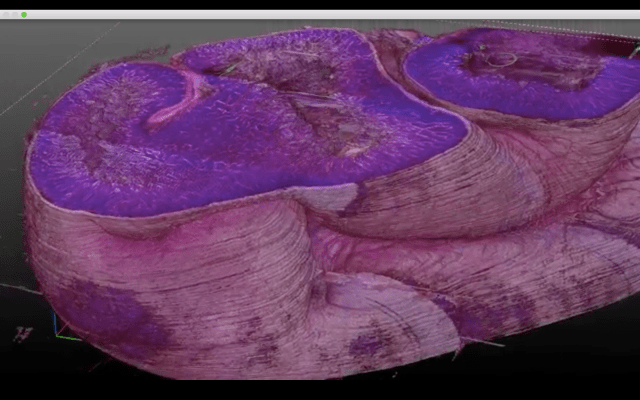Robots and software aren’t just changing manual labor in warehouses or kitchens. They’re also transforming medical research.
A San Francisco startup called 3Scan Inc. raised $14 million in venture funding to automate tissue analysis for scientists involved in drug discovery with its proprietary robotic microscope and computer vision systems.
According to the company’s co-founder and Chief Operating Officer Megan Klimen, 3Scan can eliminate some drudgery for drug researchers who have been stuck using manual processes for tissue analysis.
But more importantly, she said, 3Scan gives scientists a better view and more comprehensive data set from any given tissue sample than they have ever had before.
Today, if researchers need to examine diseased tissue, they typically attain a 1 cm block of it, embed it in something like paraffin then slice it into sections that are stained, floated in a water bath and examined under different kinds of microscopes. They typically take fewer than a dozen slices and extrapolate everything they can from the data they get from those few slices.

3Scan’s systems use robotics and machine vision to analyze tissue samples.
3Scan’s robotic microscope slices the tissue samples very precisely. Something like a micro deli-slicer, Klimen explained, 3Scan’s system can derive 10,000 slices from each tissue sample. The robotic microscope then uses machine vision to generate a digital, 3-D spatial map which researchers can review and explore on a screen, something like a topographical map of the Earth.
3Scan’s machine is so efficient that it can do a year’s worth of tissue sample analysis in one day that it would take a pathologist to do in one year using traditional methods, Klimen said.
The scans allow researchers a view into aspects of tissue that were not seen before, such as changes to vasculature, or blood flow, between tissue sample A and B. “You don’t have to use sampling techniques to make a guess about what’s in the tissue any more,” the COO said.
Lux Capital and Data Collective led the Series B investment in 3Scan, joined by Dolby Family Ventures, OS Fund, Comet Labs and Breakout Ventures, as well as the venture arm of a U.S.-based research hospital that the startup didn’t have permission to name.
The funding brings the company’s total capital raised to $22 million to-date in equity funding. Founded in 2010 by Klimen along with CEO Todd Huffman, CTO Matthew Goodman and Chief Engineer Cody Daniel, 3Scan also raised $390,000 in non-dilutive grant money from Breakout Labs and Start-Up Chile prior to raising equity financing.

3Scan’s robotic, high throughput microscope at work.
The company generates revenue by providing imaging services to pharmaceuticals companies, labs or pathologists involved in pre-clinical drug discovery, today.
In the future, it will seek FDA approvals for its machines to be used to examine human tissue. In pre-clinical drug discovery, scientists are evaluating tissue from mice or other animals.
Klimen said for now, “We’re taking our instrumentation, which we have taken beyond the prototype phase with our earlier financing, and showing people what we can do with it.”
The company, which employs about 30 full-time today in San Francisco, aims to move into bigger drug-discovery projects, and to give researchers new ways to analyze tissue using 3Scan software, including: automated cell counting and diagnosis.
